小学四年级英语练习题一般过去式2
小学一般过去时练习题及答案
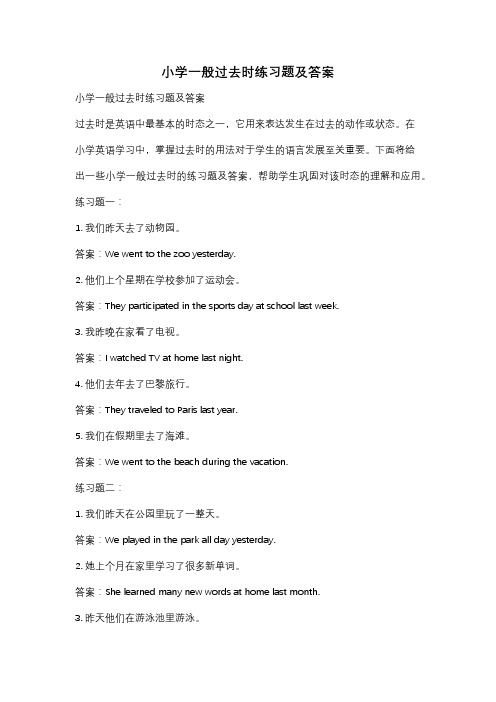
小学一般过去时练习题及答案小学一般过去时练习题及答案过去时是英语中最基本的时态之一,它用来表达发生在过去的动作或状态。
在小学英语学习中,掌握过去时的用法对于学生的语言发展至关重要。
下面将给出一些小学一般过去时的练习题及答案,帮助学生巩固对该时态的理解和应用。
练习题一:1. 我们昨天去了动物园。
答案:We went to the zoo yesterday.2. 他们上个星期在学校参加了运动会。
答案:They participated in the sports day at school last week.3. 我昨晚在家看了电视。
答案:I watched TV at home last night.4. 他们去年去了巴黎旅行。
答案:They traveled to Paris last year.5. 我们在假期里去了海滩。
答案:We went to the beach during the vacation.练习题二:1. 我们昨天在公园里玩了一整天。
答案:We played in the park all day yesterday.2. 她上个月在家里学习了很多新单词。
答案:She learned many new words at home last month.3. 昨天他们在游泳池里游泳。
答案:They swam in the swimming pool yesterday.4. 我们去年在学校举办了一次音乐会。
答案:We held a concert at school last year.5. 我们上周末去了电影院。
答案:We went to the cinema last weekend.练习题三:1. 我们昨天晚上吃了披萨。
答案:We ate pizza last night.2. 她在周末帮助了她的父母。
答案:She helped her parents on the weekend.3. 他们去年夏天去了北京旅行。
小学一般过去时专项训练题及答案
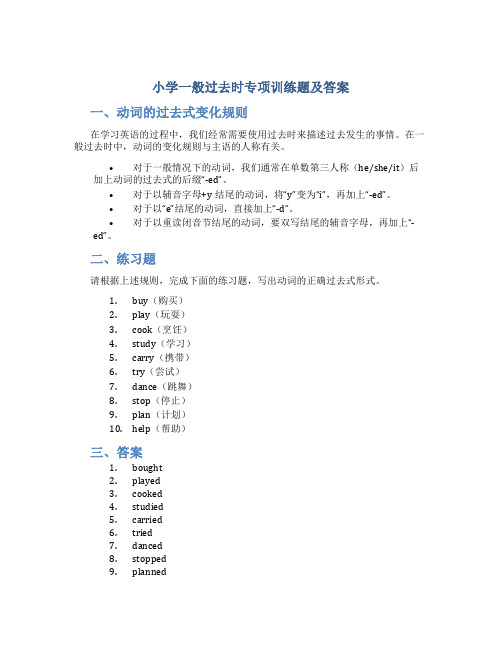
小学一般过去时专项训练题及答案一、动词的过去式变化规则在学习英语的过程中,我们经常需要使用过去时来描述过去发生的事情。
在一般过去时中,动词的变化规则与主语的人称有关。
•对于一般情况下的动词,我们通常在单数第三人称(he/she/it)后加上动词的过去式的后缀“-ed”。
•对于以辅音字母+y结尾的动词,将“y”变为“i”,再加上“-ed”。
•对于以“e”结尾的动词,直接加上“-d”。
•对于以重读闭音节结尾的动词,要双写结尾的辅音字母,再加上“-ed”。
二、练习题请根据上述规则,完成下面的练习题,写出动词的正确过去式形式。
1.buy(购买)2.play(玩耍)3.cook(烹饪)4.study(学习)5.carry(携带)6.try(尝试)7.dance(跳舞)8.stop(停止)9.plan(计划)10.help(帮助)三、答案1.bought2.played3.cooked4.studied5.carried6.tried7.danced8.stopped9.planned10.helped四、知识点总结通过以上练习题,我们了解了动词在一般过去时中的变化规则。
掌握这些规则对于正确使用过去时非常重要。
需要注意的是,一些不规则动词的过去式形式并不按照常规的规则来变换。
因此,在学习过程中,我们需要特别注意这些不规则动词,并进行针对性的练习和记忆。
希望以上的练习题对于小学生来说能够帮助加深对一般过去时的理解,提高正确使用过去时的能力。
祝大家学习进步!。
四年级英语一般过去时标志词练习题30题

四年级英语一般过去时标志词单选题30题1.I had a great time at the park _____.A.yesterdayB.tomorrowC.next week答案:A。
yesterday 是一般过去时的标志词,表示昨天。
tomorrow 表示明天,用于将来时。
next week 表示下周,用于将来时。
2.She went to the zoo _____.st weekB.next monthC.tomorrow答案:A。
last week 是一般过去时的标志词,表示上周。
next month 表示下个月,用于将来时。
tomorrow 表示明天,用于将来时。
3.We played football _____.A.yesterday morningB.tomorrow afternoonC.next Sunday答案:A。
yesterday morning 是一般过去时的标志词,表示昨天早上。
tomorrow afternoon 表示明天下午,用于将来时。
next Sunday 表示下周日,用于将来时。
4.He ate an ice cream _____.st SundayB.next weekC.tomorrow答案:A。
last Sunday 是一般过去时的标志词,表示上周日。
next week 表示下周,用于将来时。
tomorrow 表示明天,用于将来时。
5.They watched a movie _____.A.yesterday eveningB.tomorrow morningC.next Monday答案:A。
yesterday evening 是一般过去时的标志词,表示昨天晚上。
tomorrow morning 表示明天早上,用于将来时。
next Monday 表示下周一,用于将来时。
6.I did my homework _____.st nightB.tomorrow eveningC.next Saturday答案:A。
四年级英语一般过去时练习题40题
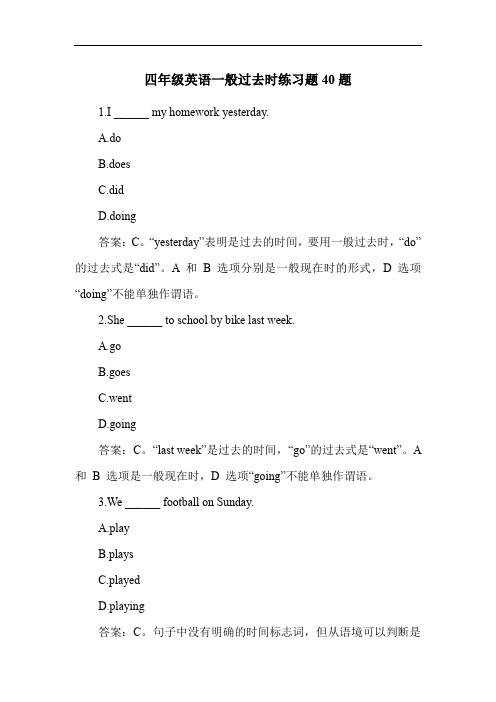
四年级英语一般过去时练习题40题1.I ______ my homework yesterday.A.doB.doesC.didD.doing答案:C。
“yesterday”表明是过去的时间,要用一般过去时,“do”的过去式是“did”。
A 和 B 选项分别是一般现在时的形式,D 选项“doing”不能单独作谓语。
2.She ______ to school by bike last week.A.goB.goesC.wentD.going答案:C。
“last week”是过去的时间,“go”的过去式是“went”。
A 和B 选项是一般现在时,D 选项“going”不能单独作谓语。
3.We ______ football on Sunday.A.playB.playsC.playedD.playing答案:C。
句子中没有明确的时间标志词,但从语境可以判断是过去发生的事情,“play”的过去式是“played”。
A 和B 选项是一般现在时,D 选项“playing”不能单独作谓语。
4.He ______ a book last night.A.readB.readsC.readingD.readed答案:A。
“last night”是过去的时间,“read”的过去式还是“read”,只是读音不同。
B 选项是一般现在时,C 选项“reading”不能单独作谓语,D 选项形式错误。
5.They ______ TV in the evening.A.watchB.watchesC.watchedD.watching答案:C。
没有明确的时间标志词,但可以从语境判断是过去的事情,“watch”的过去式是“watched”。
A 和B 选项是一般现在时,D 选项“watching”不能单独作谓语。
6.I ______ to the park with my friends.A.goB.goesC.went答案:C。
小学一般过去时练习题及答案
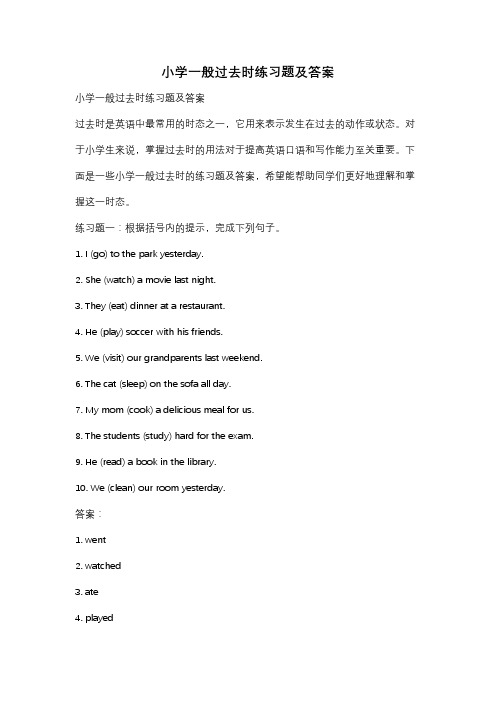
小学一般过去时练习题及答案小学一般过去时练习题及答案过去时是英语中最常用的时态之一,它用来表示发生在过去的动作或状态。
对于小学生来说,掌握过去时的用法对于提高英语口语和写作能力至关重要。
下面是一些小学一般过去时的练习题及答案,希望能帮助同学们更好地理解和掌握这一时态。
练习题一:根据括号内的提示,完成下列句子。
1. I (go) to the park yesterday.2. She (watch) a movie last night.3. They (eat) dinner at a restaurant.4. He (play) soccer with his friends.5. We (visit) our grandparents last weekend.6. The cat (sleep) on the sofa all day.7. My mom (cook) a delicious meal for us.8. The students (study) hard for the exam.9. He (read) a book in the library.10. We (clean) our room yesterday.答案:1. went2. watched3. ate4. played6. slept7. cooked8. studied9. read10. cleaned练习题二:选择适当的动词形式填空。
1. Yesterday, they ________ (play/played) basketball in the park.2. We ________ (visit/visited) the museum last week.3. He ________ (watched/watches) a movie at home yesterday.4. The cat ________ (jump/jumped) off the table.5. She ________ (dance/danced) at the party last night.6. I ________ (study/studied) English for two hours yesterday.7. They ________ (swim/swam) in the pool this morning.8. He ________ (clean/cleaned) his room yesterday.9. We ________ (listen/listened) to music in the car.10. The students ________ (finish/finished) their homework before dinner. 答案:1. played2. visited3. watched4. jumped6. studied7. swam8. cleaned9. listened10. finished练习题三:改写下列句子,将其变为过去时态。
四年级英语一般过去时句型练习题40题

四年级英语一般过去时句型练习题40题1<背景文章>Last week, our school held a wonderful sports meeting. All the students were very excited. There were many interesting events. The boys had a running race. Tom ran very fast. He ___ the first place. The girls had a long jump competition. Lily jumped very far. She got a good result. After the sports meeting, everyone was happy. We all had a great time.1. What tense is used in this passage?A. Present tenseB. Future tenseC. Past tenseD. Present continuous tense答案:C。
解析:文章描述的是上周发生的事情,用的是一般过去时。
2. What did Tom do in the sports meeting?A. He sang a song.B. He drew a picture.C. He ran in a race and won the first place.D. He played basketball.答案:C。
解析:文中提到“The boys had a running race. Tom ranvery fast. He ___ the first place.”,说明Tom 参加了跑步比赛并获得了第一名。
3. What did the girls have?A. A singing competition.B. A drawing competition.C. A long jump competition.D. A basketball game.答案:C。
四年级英语一般过去时句型练习题30题(带答案)

四年级英语一般过去时句型练习题30题(带答案)1.I ______ my homework yesterday.A.doB.doesC.didD.doing答案解析:C。
一般过去时肯定句结构是主语+动词的过去式。
do 的过去式是did。
A 和B 选项分别是动词原形和动词的第三人称单数形式,不符合一般过去时的要求。
D 选项doing 是现在分词形式,也不正确。
2.She ______ to school on foot yesterday.A.goB.goesC.wentD.going答案解析:C。
go 的过去式是went。
A 选项是动词原形,B 选项是第三人称单数形式,D 选项是现在分词形式,都不符合一般过去时的要求。
3.We ______ a picnic last Sunday.A.haveB.hasC.had答案解析:C。
have 的过去式是had。
A 和B 选项分别是动词原形和第三人称单数形式,D 选项是现在分词形式,都不是一般过去时的正确形式。
4.He ______ basketball with his friends yesterday.A.playB.playsC.playedD.playing答案解析:C。
play 的过去式是played。
A 选项是动词原形,B 选项是第三人称单数形式,D 选项是现在分词形式,都不符合一般过去时的要求。
5.They ______ a good time at the park yesterday.A.haveB.hasC.hadD.having答案解析:C。
have 的过去式是had。
A 和B 选项分别是动词原形和第三人称单数形式,D 选项是现在分词形式,都不是一般过去时的正确形式。
6.My mother ______ some delicious food for us yesterday.A.cookC.cookedD.cooking答案解析:C。
四年级英语过去进行时与一般过去时混合练习题40题(带答案)

四年级英语过去进行时与一般过去时混合练习题40题(带答案)1. I ______ (read) a book when my mother came home yesterday.A. readB. was readingC. readsD. am reading答案:B。
解析:这题考查过去进行时和一般过去时的用法。
选项A“read”是一般现在时或一般过去时(read的过去式形式不变),这里表示当妈妈昨天回家这个过去动作发生时,我正在读书,不是一般的过去动作,所以A错误。
选项B“was reading”是过去进行时,强调在过去某个时刻正在进行的动作,符合语境。
选项C“reads”是一般现在时的第三人称单数形式,时态不对。
选项D“am reading”是现在进行时,与句子中的时间状语yesterday不匹配。
2. He ______ (play) football on the playground last Sunday.A. playsB. playedC. was playingD. is playing答案:B。
解析:这里考查一般过去时。
选项A“plays”是一般现在时,而句子中的last Sunday表明是过去的时间,所以A错误。
选项B“played”是一般过去时,表示过去某个时间发生的动作,符合题意。
选项C“was playing”是过去进行时,这里没有强调正在进行的动作,只是陈述上周日踢足球这个过去的事实,所以C错误。
选项D“is playing”是现在进行时,时态与句子中的时间不相符。
3. What ______ you ______ (do) at 8 o'clock last night?A. do; doB. did; doC. were; doingD. are; doing答案:C。
解析:这题是对过去进行时的考查。
句中的时间状语at 8 o'clock last night是过去某个具体的时间点,问的是在这个时间点正在做什么。
四年级英语一般过去时单选题30题

四年级英语一般过去时单选题30题1.I ______ to the park yesterday.A.goB.wentC.goesD.going答案:B。
选项A 是一般现在时;选项C 也是一般现在时;选项 D 是现在分词。
句子中有yesterday,要用一般过去时,went 是go 的过去式。
2.She ______ her homework last night.A.doB.doesC.didD.doing答案:C。
选项 A 和 B 是一般现在时;选项 D 是现在分词。
last night 表明要用一般过去时,did 是do 的过去式。
3.We ______ football after school yesterday.A.playB.playedC.playsD.playing答案:B。
选项 A 和 C 是一般现在时;选项 D 是现在分词。
yesterday 提示用一般过去时,played 是play 的过去式。
4.He ______ to bed early last night.A.goB.wentC.goesD.going答案:B。
选项 A 和 C 是一般现在时;选项 D 是现在分词。
last night 要用一般过去时,went 是go 的过去式。
5.They ______ a good time at the party last week.A.haveB.hadC.hasD.having答案:B。
选项 A 和 C 是一般现在时;选项 D 是现在分词。
last week 表明用一般过去时,had 是have 的过去式。
6.I ______ breakfast at 7:30 yesterday morning.A.haveB.hadC.hasD.having答案:B。
选项 A 和 C 是一般现在时;选项 D 是现在分词。
yesterday morning 要用一般过去时,had 是have 的过去式。
四年级英语一般过去时句型练习题30题(答案解析)
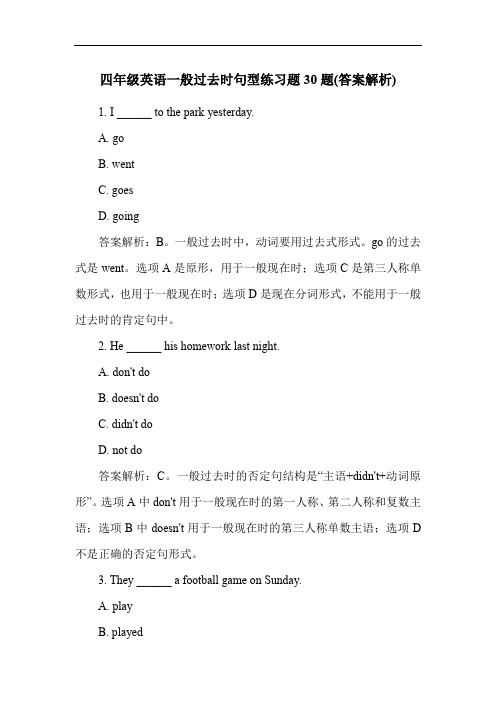
四年级英语一般过去时句型练习题30题(答案解析)1. I ______ to the park yesterday.A. goB. wentC. goesD. going答案解析:B。
一般过去时中,动词要用过去式形式。
go的过去式是went。
选项A是原形,用于一般现在时;选项C是第三人称单数形式,也用于一般现在时;选项D是现在分词形式,不能用于一般过去时的肯定句中。
2. He ______ his homework last night.A. don't doB. doesn't doC. didn't doD. not do答案解析:C。
一般过去时的否定句结构是“主语+didn't+动词原形”。
选项A中don't用于一般现在时的第一人称、第二人称和复数主语;选项B中doesn't用于一般现在时的第三人称单数主语;选项D 不是正确的否定句形式。
3. They ______ a football game on Sunday.A. playB. playedC. playsD. playing答案解析:B。
根据句中的on Sunday可知是过去的时间,句子要用一般过去时,动词要用过去式。
play的过去式是played。
选项A 是原形,用于一般现在时;选项C是第三人称单数形式,用于一般现在时;选项D是现在分词形式,不能用于一般过去时的肯定句。
4. She ______ to school by bike this morning.A. didn't goB. doesn't goC. not goD. don't go答案解析:A。
根据this morning可知是过去的时间,句子要用一般过去时,一般过去时的否定句结构是“主语+didn't+动词原形”。
选项B中doesn't用于一般现在时的第三人称单数主语;选项C不是正确的否定句形式;选项D中don't用于一般现在时的第一人称、第二人称和复数主语。
四年级英语一般过去时句型练习题30题含答案解析

四年级英语一般过去时句型练习题30题含答案解析1.I ______ breakfast at 7:30 yesterday.A.haveB.hadC.has答案解析:B。
本题考查一般过去时的用法。
yesterday 是一般过去时的标志词,所以动词要用过去式。
have 的过去式是had。
A 选项have 是一般现在时;C 选项has 是第三人称单数的一般现在时。
2.She ______ to school by bus yesterday.A.goB.wentC.goes答案解析:B。
yesterday 表明要用一般过去时,go 的过去式是went。
A 选项go 是一般现在时;C 选项goes 是第三人称单数的一般现在时。
3.He ______ his homework after school yesterday.A.doB.didC.does答案解析:B。
有yesterday 要用一般过去时,do 的过去式是did。
A 选项do 是一般现在时;C 选项does 是第三人称单数的一般现在时。
4.We ______ a picnic last Sunday.A.haveB.hadC.has答案解析:B。
last Sunday 是一般过去时的标志词,have 的过去式是had。
A 选项have 是一般现在时;C 选项has 是第三人称单数的一般现在时。
5.They ______ football yesterday afternoon.A.playB.playedC.plays答案解析:B。
yesterday afternoon 表明要用一般过去时,play 的过去式是played。
A 选项play 是一般现在时;C 选项plays 是第三人称单数的一般现在时。
6.I ______ to bed early last night.A.goB.wentC.goes答案解析:B。
last night 是一般过去时的标志词,go 的过去式是went。
四年级英语一般过去时试题答案及解析
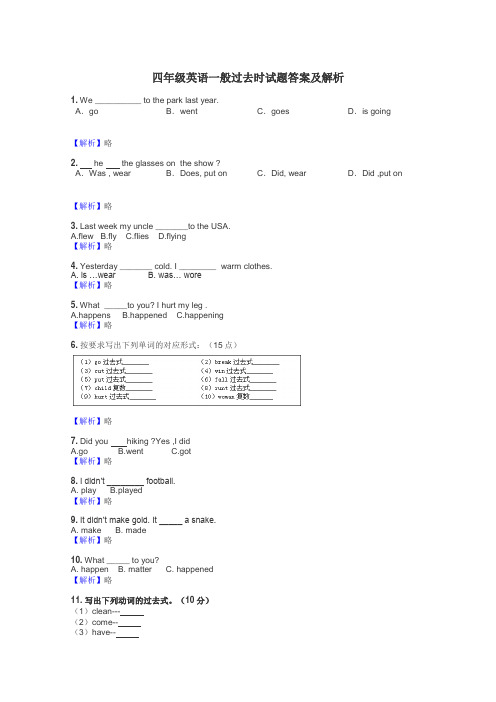
四年级英语一般过去时试题答案及解析1. We __________ to the park last year.A.go B.went C.goes D.is going【解析】略2. he the glasses on the show ?A.Was , wear B.Does, put on C.Did, wear D.Did ,put on【解析】略3. Last week my uncle _______to the USA.A.flewB.flyC.fliesD.flying【解析】略4. Yesterday _______ cold. I ________ warm clothes.A. is …wearB. was… wore【解析】略5. What _____to you? I hurt my leg .A.happensB.happenedC.happening【解析】略6.按要求写出下列单词的对应形式:(15点)【解析】略7. Did you hiking ?Yes ,I didA.goB.wentC.got【解析】略8.I didn’t ________ football.A. playB.played【解析】略9.It didn’t make gold. It _____ a snake.A. makeB. made【解析】略10. What _____ to you?A. happenB. matterC. happened【解析】略11.写出下列动词的过去式。
(10分)(1)clean---(2)come--(3)have--(4)print--(5)cry--(6)eat--(7)help--(8)say--(9)win--(10)go—【解析】略12. Amy fell over. She ______her fingers.A. hurtedB. hurtC. hurting【解析】略13. Yesterday Lingling __________.A.go skateB. went skateC. went skating【解析】略14. I looked for my key,but I didn’t ______it.A.foundB. findC. finded【解析】略15. Did you ______ the Great Wall?A.seeB.seesC.saw.【答案】A【解析】略16. Yesterday I _______ Grandma.A.phoneB.phonedC.phones【答案】B【解析】略17.Yesterday Maomao didn’t ____ to school. She ___ to the park.A. go… wentB. went…wentC. go…goes【解析】略18. Yesterday I _____ my bedroom.A. cleanB. cleanedC. cleans【解析】略19. I _______ like some soup.A. didB. wouldC. am【答案】B【解析】略20. I noodles.A.washed B.finished C.cooked D.helped【答案】C【解析】略。
四年级英语一般过去时句型练习题40题

四年级英语一般过去时句型单选题40题1.I ______ to the park yesterday.A.goB.wentC.goesD.going答案:B。
“yesterday”表明是过去的时间,要用一般过去时,go 的过去式是went。
A 选项是动词原形,用于一般现在时;C 选项是第三人称单数形式,也用于一般现在时;D 选项是现在分词,不能单独作谓语。
2.We ______ a picnic last weekend.A.haveB.hadC.hasD.having答案:B。
“last weekend”是过去的时间,have 的过去式是had。
A 选项是动词原形,用于一般现在时;C 选项是第三人称单数形式,用于一般现在时;D 选项是现在分词,不能单独作谓语。
3.She ______ a book on Sunday.A.readB.readsC.readingD.readed答案:A。
read 的过去式还是read,只是读音不同。
B 选项是动词第三人称单数形式,用于一般现在时;C 选项是现在分词,不能单独作谓语;D 选项形式错误。
4.My brother ______ football yesterday afternoon.A.playB.playedC.playsD.playing答案:B。
“yesterday afternoon”是过去的时间,play 的过去式是played。
A 选项是动词原形,用于一般现在时;C 选项是第三人称单数形式,用于一般现在时;D 选项是现在分词,不能单独作谓语。
5.They ______ swimming in the pool last summer.A.goB.wentC.goesD.going答案:B。
“last summer”是过去的时间,go 的过去式是went。
A 选项是动词原形,用于一般现在时;C 选项是第三人称单数形式,用于一般现在时;D 选项是现在分词,不能单独作谓语。
小学四年级英语练习试题一般过去式

一般过去时1.一般过去时表示过去某个时间发生的动作或存在的状态,常和表示过去的时间状语连用。
一般过去时也表示过去经常或反复发生的动作感谢。
2.Be动词在一般过去时中的变化:⑴am和is在一般过去时中变为was(was not=wasn’t)⑵are在一般过去时中变为were(were not=weren’t)⑶带有was或were的句子,其否定、疑问的变化和is, am, are一样,即否定句在was或were后加not,一般疑问句把was或were调到句首。
3.句中没有be动词的一般过去时的句子否定句:didn’t +动词原形,如:Jim didn’t go home yesterday.一般疑问句:在句首加did,句子中的动词过去式变回原形。
如:Did Jim go home yesterday?特殊疑问句:⑴疑问词+did+主语+动词原形?如:What did Jim do yesterday?⑵疑问词当主语时:疑问词+动词过去式?如:Who went to home yesterday?动词过去式变化规则:1.一般在动词末尾加-ed,如:pull-pulled, cook-cooked 2.结尾是e加d,如:taste-tasted3.末尾只有一个元音字母和一个辅音字母的重读闭音节,应双写末尾的辅音字母,再加-ed,如:stop-stopped 4.以“辅音字母+y”结尾的,变y为i,再加-ed,如:study-studied5.不规则动词过去式:am,is-was, are-were, do-did, see-saw, say-said, give-gave, get-got, go-went, come-came,have-had, eat-ate, take-took, run-ran, sing-sang, put-put, make-made, read-read, write-wrote, draw-drew,drink-drank, fly-flew, ride-rode, speak-spoke, sweep-swept, swim-swam, sit-sat过去时练习写出下列动词的过去式is\am_______ fly_______ plant_______ are_______ drink_______ play_______ go_______ make_______ does_______ dance_______ worry________ ask_______ taste_______ eat_______ draw________ put_______ throw_______ kick_______ pass_______ do_______Be动词的过去时练习(1)一、用be动词的适当形式填空1. I _______ at school just now.2. He ________ at the camp last week.3. We ________ students two years ago.4. They ________ on the farm a moment ago.5. Yang Ling ________ eleven years old last year.6. There ________ an apple on the plate yesterday.7. There ________ some milk in the fridge on Sunday.8. The mobile phone _______ on the sofa yesterday evening.二、句型转换1. It was exciting.否定句:______________________________________________ 一般疑问句:___________________________________________ 肯、否定回答:__________________________________________2. All the students were very excited.否定句:______________________________________________一般疑问句:___________________________________________肯、否定回答:__________________________________________3. They were in his pocket.否定句:______________________________________________ 一般疑问句:___________________________________________肯、否定回答:__________________________________________Be动词的过去时练习(2)一、用be动词的适当形式填空1. I _______ an English teacher now.2. She _______ happy yesterday.3. They _______ glad to see each other last month.4. Helen and Nancy _______ good friends.5. The little dog _______ two years old this year.6. Look, there _______ lots of grapes here.7. There _______ a sign on the chair on Monday..8. Today _______ the second of June. Yesterday _______the first of June. It _______ Children’s Day. All the students _______ very excited.二、句型转换1. There was a car in front of the house just now.否定句:______________________________________________ 一般疑问句:___________________________________________肯、否定回答:__________________________________________三、中译英1.我的故事书刚才还在手表旁边。
四年级英语一般过去时句型练习题30题含答案解析

四年级英语一般过去时句型练习题30题含答案解析1.I __________ football with my friends yesterday.A.playB.playedC.plays答案解析:B。
本题考查一般过去时,yesterday 是明显的一般过去时的标志词,动词要用过去式,play 的过去式是played。
A 选项是动词原形,C 选项是第三人称单数形式,都不符合。
2.We __________ a picnic in the park last weekend.A.haveB.hadC.has答案解析:B。
last weekend 表明是一般过去时,have 的过去式是had。
A 选项是动词原形,C 选项是第三人称单数形式,都不正确。
3.She __________ a book in the library on Monday.A.readB.readsC.reading答案解析:A。
on Monday 可判断是一般过去时,read 的过去式还是read。
B 选项是动词第三人称单数形式,C 选项是现在分词,都不合适。
4.My father __________ to work by car yesterday.A.goB.wentC.goes答案解析:B。
yesterday 提示用一般过去时,go 的过去式是went。
A 选项是动词原形,C 选项是第三人称单数形式,都不对。
5.They __________ swimming in the pool last summer.A.goB.wentC.goes答案解析:B。
last summer 表明是一般过去时,go 的过去式是went。
A 选项是动词原形,C 选项是第三人称单数形式,都不符合。
6.I __________ my homework after school yesterday.A.doB.didC.does答案解析:B。
2024年四年级英语一般过去时标志词练习题30题

2024年四年级英语一般过去时标志词单选题30题1.I went to the park ______.A.yesterdayB.tomorrowC.nowD.often答案:A。
“yesterday”是一般过去时的标志词,“went”是过去式,与“yesterday”搭配正确。
“tomorrow”是将来时标志词,“now”一般用于现在进行时或一般现在时,“often”常用于一般现在时。
2.She ______ her homework last night.A.doB.doesC.didD.doing答案:C。
“last night”是一般过去时标志词,动词要用过去式,“did”是“do”的过去式。
“do”和“does”是一般现在时,“doing”是现在分词不能单独作谓语。
3.My father bought a new book ______.A.next weekst weekC.every weekD.in a week答案:B。
“last week”是一般过去时标志词,“bought”是过去式,符合。
“next week”是将来时标志词,“every week”用于一般现在时,“in a week”也是将来时的表达。
4.We ______ to the zoo yesterday.A.goB.goesC.wentD.going答案:C。
“yesterday”是一般过去时标志词,“went”是“go”的过去式。
“go”和“goes”是一般现在时,“going”是现在分词不能单独作谓语。
5.He ______ football last Sunday.A.playB.playsC.playedD.playing答案:C。
“last Sunday”是一般过去时标志词,“played”是“play”的过去式。
“play”和“plays”是一般现在时,“playing”是现在分词不能单独作谓语。
四年级英语时态转换练习题50题含答案解析
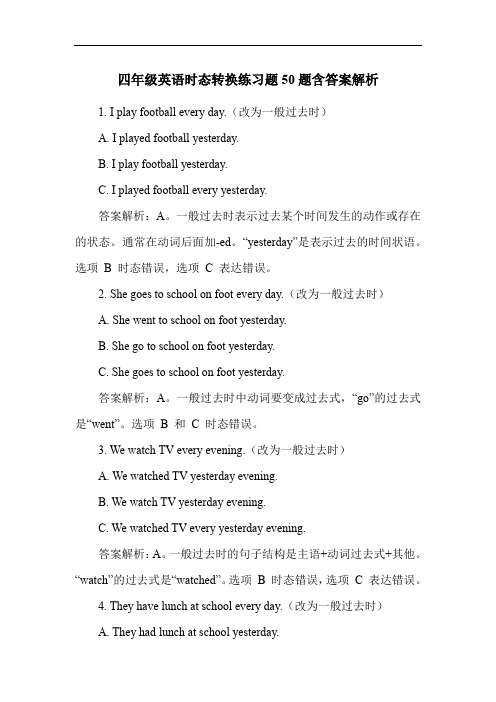
四年级英语时态转换练习题50题含答案解析1. I play football every day.(改为一般过去时)A. I played football yesterday.B. I play football yesterday.C. I played football every yesterday.答案解析:A。
一般过去时表示过去某个时间发生的动作或存在的状态。
通常在动词后面加-ed。
“yesterday”是表示过去的时间状语。
选项B 时态错误,选项C 表达错误。
2. She goes to school on foot every day.(改为一般过去时)A. She went to school on foot yesterday.B. She go to school on foot yesterday.C. She goes to school on foot yesterday.答案解析:A。
一般过去时中动词要变成过去式,“go”的过去式是“went”。
选项B 和C 时态错误。
3. We watch TV every evening.(改为一般过去时)A. We watched TV yesterday evening.B. We watch TV yesterday evening.C. We watched TV every yesterday evening.答案解析:A。
一般过去时的句子结构是主语+动词过去式+其他。
“watch”的过去式是“watched”。
选项B 时态错误,选项C 表达错误。
4. They have lunch at school every day.(改为一般过去时)A. They had lunch at school yesterday.B. They have lunch at school yesterday.C. They had lunch at school every yesterday.答案解析:A。
四年级英语一般过去时单选题 30 题

四年级英语一般过去时单选题30 题1. I ______ to the park yesterday.A. goB. goesC. wentD. going答案:C。
解析:一般过去时的基本结构是主语+动词过去式+其他。
句中时间状语是yesterday(昨天),表示过去的时间,所以动词要用过去式。
选项A是动词原形,用于一般现在时的非第三人称单数形式;选项B是动词的第三人称单数形式,用于一般现在时的第三人称单数;选项D是动词的现在分词形式,不能用于一般过去时。
2. He ______ his homework last night.A. doB. doesC. didD. done答案:C。
解析:last night((昨晚)表明是过去的时间,句子要用一般过去时,动词要用过去式。
选项A是动词原形,用于一般现在时的非第三人称单数形式;选项B是动词的第三人称单数形式,用于一般现在时的第三人称单数;选项D是动词的过去分词形式,不能单独作谓语用于一般过去时。
3. They ______ a movie on Sunday.B. seesC. sawD. seeing答案:C。
解析:on Sunday((在周日)这里表示过去的周日,句子要用一般过去时,动词要用过去式。
选项A是动词原形,用于一般现在时的非第三人称单数形式;选项B是动词的第三人称单数形式,用于一般现在时的第三人称单数;选项D是动词的现在分词形式,不能用于一般过去时。
4. She ______ a book in the library last week.A. readB. readsC. readingD. red答案:A。
解析:last week((上周)表示过去的时间,句子要用一般过去时。
read的过去式是read,读音为[red]。
选项B是动词的第三人称单数形式,用于一般现在时的第三人称单数;选项C是动词的现在分词形式,不能用于一般过去时;选项D是颜色“红色”的英文,不是read的正确形式。
小学英语一般过去时练习题

小学英语一般过去时练习题小学英语一般过去时是英语时态学习中的一个重要部分,它描述的是过去发生的动作或状态。
以下是一些练习题,帮助学生加深对一般过去时的理解与应用:1. 选择题:- I _______ my homework yesterday.A) do B) did C) am doing D) will do- 正确答案:B2. 填空题:- She _______ (go) to the park with her friends last Sunday.- 答案:went3. 改错题:- He is playing football now.- 改为过去时:He played football yesterday.4. 翻译题:- 昨天我去了图书馆。
- 翻译:I went to the library yesterday.5. 完成句子:- 昨天,我_________ (做)我的作业。
- 答案:did6. 对话填空:- A: What did you do last night?B: I _______ (watch) a movie.- 答案:watched7. 动词时态转换:- 原句:She goes to school every day.- 转换为过去时:She went to school yesterday.8. 连词成句:- 1) did, you, what, yesterday, do- 答案:What did you do yesterday?9. 判断题:- The boy is reading a book. (改为一般过去时)- The boy read a book.- 正确/错误:正确10. 写作练习:- 写一篇短文,描述你上个周末的活动。
使用一般过去时。
这些练习题覆盖了一般过去时的基本用法,包括规则动词和不规则动词的过去式形式,以及时态在句子中的应用。
通过这些练习,学生可以更好地掌握一般过去时的用法。
- 1、下载文档前请自行甄别文档内容的完整性,平台不提供额外的编辑、内容补充、找答案等附加服务。
- 2、"仅部分预览"的文档,不可在线预览部分如存在完整性等问题,可反馈申请退款(可完整预览的文档不适用该条件!)。
- 3、如文档侵犯您的权益,请联系客服反馈,我们会尽快为您处理(人工客服工作时间:9:00-18:30)。
一般过去时1.一般过去时表示过去某个时间发生的动作或存在的状态,常和表示过去的时间状语连用。
一般过去时也表示过去经常或反复发生的动作感谢。
2.Be动词在一般过去时中的变化:⑴am和is在一般过去时中变为was(was not=wasn’t)⑵are在一般过去时中变为were(were not=weren’t)⑶带有was或were的句子,其否定、疑问的变化和is, am, are一样,即否定句在was或were后加not,一般疑问句把was或were调到句首。
3.句中没有be动词的一般过去时的句子否定句:didn’t +动词原形,如:Jim didn’t go home yesterday.一般疑问句:在句首加did,句子中的动词过去式变回原形。
如:Did Jim go home yesterday?特殊疑问句:⑴疑问词+did+主语+动词原形?如:What did Jim do yesterday?⑵疑问词当主语时:疑问词+动词过去式?如:Who went to home yesterday?动词过去式变化规则:1.一般在动词末尾加-ed,如:pull-pulled, cook-cooked 2.结尾是e加d,如:taste-tasted3.末尾只有一个元音字母和一个辅音字母的重读闭音节,应双写末尾的辅音字母,再加-ed,如:stop-stopped 4.以“辅音字母+y”结尾的,变y为i,再加-ed,如:study-studied5.不规则动词过去式:am,is-was, are-were, do-did, see-saw, say-said, give-gave, get-got, go-went, come-came,have-had, eat-ate, take-took, run-ran, sing-sang, put-put, make-made, read-read, write-wrote, draw-drew,drink-drank, fly-flew, ride-rode, speak-spoke, sweep-swept, swim-swam, sit-sat过去时练习写出下列动词的过去式is\am_______ fly_______ plant_______ are_______ drink_______ play_______ go_______ make_______ does_______ dance_______ worry________ ask_______ taste_______ eat_______ draw________ put_______ throw_______ kick_______ pass_______ do_______Be动词的过去时练习(1)一、用be动词的适当形式填空1. I _______ at school just now.2. He ________ at the camp last week.3. We ________ students two years ago.4. They ________ on the farm a moment ago.5. Yang Ling ________ eleven years old last year.6. There ________ an apple on the plate yesterday.7. There ________ some milk in the fridge on Sunday.8. The mobile phone _______ on the sofa yesterday evening.二、句型转换1. It was exciting.否定句:______________________________________________ 一般疑问句:___________________________________________ 肯、否定回答:__________________________________________2. All the students were very excited.否定句:______________________________________________一般疑问句:___________________________________________肯、否定回答:__________________________________________3. They were in his pocket.否定句:______________________________________________ 一般疑问句:___________________________________________肯、否定回答:__________________________________________Be动词的过去时练习(2)一、用be动词的适当形式填空1. I _______ an English teacher now.2. She _______ happy yesterday.3. They _______ glad to see each other last month.4. Helen and Nancy _______ good friends.5. The little dog _______ two years old this year.6. Look, there _______ lots of grapes here.7. There _______ a sign on the chair on Monday..8. Today _______ the second of June. Yesterday _______the first of June. It _______ Children’s Day. All the students _______ very excited.二、句型转换1. There was a car in front of the house just now.否定句:______________________________________________ 一般疑问句:___________________________________________肯、否定回答:__________________________________________三、中译英1.我的故事书刚才还在手表旁边。
_______________________________________________ _____2.他们的外套上个礼拜放在卧室里了。
_______________________________________________ _____3.一会以前花园里有两只小鸟。
_______________________________________________ ___行为动词的过去时练习(1)一、用动词的适当形式填空1. He ________ (live) in Wuxi two years ago.2. The cat _______ (eat) a bird last night.3. We _______ (have) a party last Halloween.4. Nancy ________ (pick) up oranges on the farm last week.5. I ________ (make) a model ship with Mike yesterday.6. They _______ (play) chess in the classroom last PE lesson.7. My mother _______ (cook) a nice food last Spring Festival.8. The girls _______ (sing) and _______ (dance) at the party.二、句型转换1. Su Hai took some photos at the Sports day.否定句:_______________________________________________ 一般疑问句:____________________________________________肯、否定回答:__________________________________________2. Nancy went to school early.否定句:_______________________________________________ _一般疑问句:____________________________________________ 肯、否定回答:__________________________________________3. We sang some English songs.否定句:_______________________________________________ _一般疑问句:____________________________________________ 肯、否定回答:__________________________________________行为动词的过去时练习(2)一、用动词的适当形式填空1. I ______ (watch) a cartoon on Saturday.2. Her father _______ (read) a newspaper last night.3. We ________ to zoo yesterday, we _______ to the park. (go)4. _______ you _______ (visit) your relatives last SpringFestival?5. _______ he _______ (fly) a kite on Sunday? Yes, he _______.6. Gao Shan _______ (pull) up carrots last National Day holiday.7. I ______ (sweep) the floor yesterday, but my mother _______.8. What ______ she _______ (find) in the garden last morning? She _______ (find) a beautiful butterfly.二、句型转换1. They played football in the playground.否定句:______________________________________________ 一般疑问句:____________________________________________ 肯、否定回答:__________________________________________一、用动词的适当形式填空1. It _______ (be) Ben’s birthday last Friday.2. We all _______ (have) a good time last night.3. He ________ (jump) high on last Sports Day.4. Helen ________ (milk) a cow on Friday.5. She likes _______ newspapers, but she _______ a book yesterday. (read)6. He _______ football now, but they _______ basketball just now. (play)7. Jim’s mother ________ (plant) trees just now.8. _______ they ________ (sweep) the floor on Sunday? No, they _______.9. I _______ (watch) a cartoon on Monday.10. We ________ (go) to school on Sunday.过去时综合练习(2)一、用动词的适当形式填空1. It _______ (be) the 2nd of November yesterday.Mr White ________ (go) to his office by car.2. Gao Shan ________ (put) the book on his head a moment ago.3. Don’t _______ the house. Mum _______ it yesterday. (clean)4. What _______ you ______ just now? I _______ some housework. (do)5. They _________ (make) a kite a week ago.6. I want to _______ apples. But my dad _______ all of them last month. (pick)7. _______ he _______ the flowers this morning? Yes, he _______. (water)8. She _______ (be) a pretty girl. Look, she _______ (do) Chinese dances.9. The students often _________ (draw) some pictures in the art room.10.What _______ Mike do on the farm? He ________ cows. (milk)。
